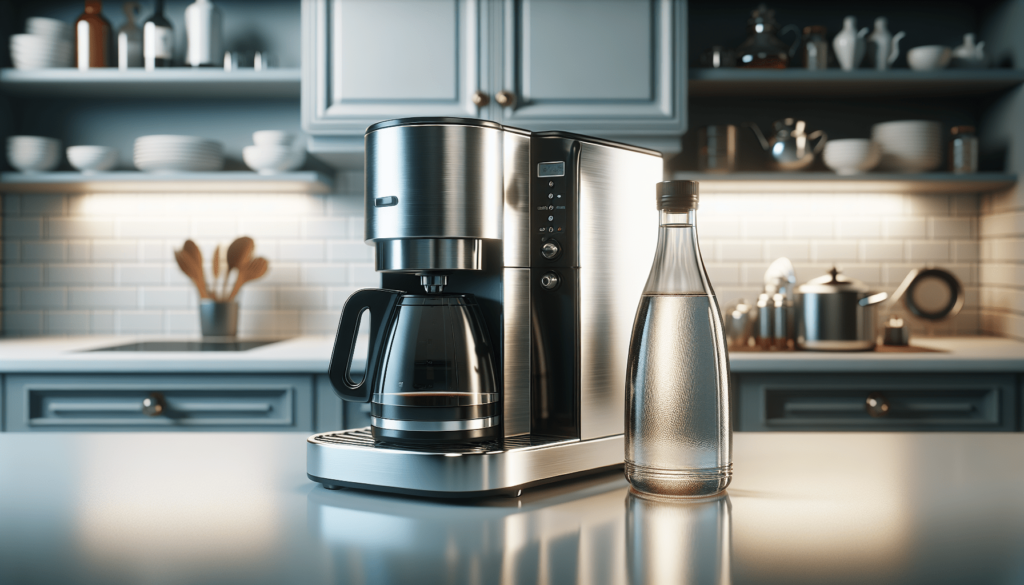Have you ever wondered if using vinegar to clean your coffee maker is the right way to go? With so many cleaning methods out there, it’s easy to feel unsure about which one to choose. Let’s dive into the nitty-gritty of using vinegar for cleaning your coffee maker and find out if it’s really the best option for you.

Understanding the Importance of Cleaning Your Coffee Maker
Cleaning your coffee maker is essential for several reasons. Not only does it help ensure that your coffee tastes great, but it also prolongs the life of your machine and prevents any health issues. Over time, coffee makers accumulate oil residues, hard water deposits, and even mold, which can affect both the flavor and safety of your daily brew.
The Effects of an Unclean Coffee Maker
Leaving your coffee maker uncleaned can have some unpleasant consequences. These include:
- Bad Taste: Residues and deposits in the coffee maker can make your coffee taste bitter or sour.
- Health Risks: Mold and bacteria can grow in coffee makers, especially in the water reservoir and filter basket.
- Reduced Efficiency: Hard water deposits can clog your machine, reducing its efficiency and potentially causing it to break down.
Why Vinegar?
You might have heard that vinegar is a great household cleaner. It’s a natural, non-toxic substance that can cut through grease, disinfect, and remove odors. But how effective is it for cleaning a coffee maker?
Acetic Acid: The Magic Ingredient
The primary cleaning agent in vinegar is acetic acid, which has several properties that make it a good cleaner:
- De-scaling Properties: Acetic acid can dissolve mineral deposits from hard water.
- Antimicrobial: It can kill some types of bacteria and mold.
- Deodorizing: Vinegar can neutralize odors, leaving your coffee maker smelling fresh.
White Vinegar vs. Other Types
When it comes to cleaning, white vinegar is often recommended because it is the most acidic and least likely to leave any flavors behind. Other types of vinegar, like apple cider vinegar, could leave a lingering taste or aroma.
The Right Method to Use Vinegar for Cleaning
If you decide to use vinegar to clean your coffee maker, it’s important to follow the correct method to ensure thorough cleaning without damaging your machine.
Materials Needed
- White vinegar
- Water
- Clean cloth or sponge
Step-by-Step Guide
- Empty the Coffee Maker: Remove any coffee grounds and empty the carafe.
- Prepare the Vinegar Solution: Mix equal parts of white vinegar and water. For a standard 12-cup coffee maker, you’ll need about 6 cups of each.
- Fill the Water Reservoir: Pour the vinegar solution into the coffee maker’s water reservoir.
- Run a Brew Cycle: Start the brew cycle and let it run halfway. Pause the cycle for about 30 minutes to allow the vinegar to sit and break down any buildup.
- Complete the Brew Cycle: After 30 minutes, resume and complete the brew cycle.
- Rinse the Coffee Maker: Run two or three cycles with fresh water to rinse out any remaining vinegar.
Recommended Frequency
It’s generally a good idea to clean your coffee maker with vinegar every three to six months. If you have hard water, you might need to clean it more frequently.
Pros and Cons of Using Vinegar
While vinegar is a popular cleaning agent, it does come with its own set of advantages and disadvantages.
Pros
- Natural and Non-Toxic: Safe for you and the environment.
- Effective: Good at removing mineral deposits and some bacteria and mold.
- Economical: Much cheaper than commercial cleaners.
Cons
- Odor: Vinegar has a strong smell that some people find unpleasant.
- Taste: If not rinsed thoroughly, it can leave a vinegar taste in your coffee.
- Potential Damage: Overuse of vinegar can degrade rubber seals and other parts of the coffee maker over time.

Alternatives to Vinegar
If vinegar isn’t your preferred choice, there are other methods to clean your coffee maker.
Lemon Juice
Lemon juice is another natural option. It’s less acidic than vinegar but still effective in breaking down mineral deposits.
Baking Soda
Baking soda is excellent for getting rid of odors and mild stains. However, it’s not as effective in removing mineral deposits.
Commercial Descaling Solutions
Specialized descaling solutions are designed specifically for coffee makers. They’re effective but can be more expensive.
| Cleaner | Pros | Cons |
|---|---|---|
| Vinegar | Natural, non-toxic, effective, economical | Strong smell, potential for lingering taste, can damage machine over time |
| Lemon Juice | Natural, pleasant smell | Less effective than vinegar |
| Baking Soda | Odor removal, mild stain cleaning | Not effective against mineral deposits |
| **Commercial Descaler | Highly effective, specifically designed for machines | More expensive, contains chemicals |
Tips for Regular Maintenance
Regular maintenance can help keep your coffee maker in top shape, reducing the need for deep cleaning.
Daily Maintenance
- Empty Grounds: Always empty the coffee grounds after each use to prevent mold and bacteria growth.
- Wipe Down: Wipe down the exterior and any removable parts with a damp cloth.
Weekly Maintenance
- Clean Removable Parts: Clean the carafe, filter basket, and any removable parts with warm, soapy water.
Monthly Maintenance
- Inspect Machine: Check for any buildup or wear and tear.
- Descale: If you use your machine frequently, consider descaling it monthly.
Common Myths and Misconceptions
There are a few myths about cleaning coffee makers that you might have come across. Let’s clear up some of the common misconceptions.
Myth: “Vinegar Can Kill All Germs”
While vinegar is good for killing some bacteria and mold, it’s not effective against all germs. If you’re concerned about sanitizing your coffee maker, you may need stronger commercial solutions.
Myth: “You Can Use Any Vinegar”
Not all vinegars are created equal. Stick with white vinegar to avoid any residual flavors or smells.
Myth: “More Vinegar is Better”
Using too much vinegar or cleaning too frequently with it can damage your coffee maker over time. Stick to the recommended dilution and cleaning frequency.
Conclusion
Cleaning your coffee maker with vinegar is a tried and tested method that offers a balance of effectiveness, safety, and cost. However, like any cleaning method, it has its pros and cons. By understanding the proper way to use vinegar and considering alternatives, you can ensure that your coffee maker stays clean and functions optimally. Regular maintenance and cleaning will not only keep your coffee tasting great but also extend the life of your machine. So, should you use vinegar to clean your coffee maker? It largely depends on your personal preferences and specific needs, but it’s certainly a viable option worth considering.
By taking the time to clean and maintain your coffee maker, you’re investing in better-tasting coffee and a healthier, longer-lasting machine.
